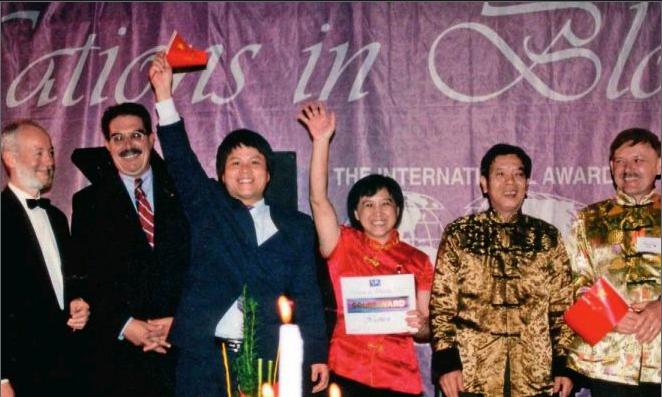Bill Loves China
2014-10-29BystaffreporterZHOULIN
By+staff+reporter+ZHOU+LIN


BILL Brown, Fujians first foreign perma- nent resident, has been a professor in Xiamen Universitys School of Management since he helped start the MBA program in 1988. Currently, he hosts the weekly TV program Xingfu Fujian (Happiness in Fujian) for Strait Star, a Fujian-based TV station. Proudly, he tells people that his greatest honor was helping Xiamen win international awards as the most livable city.
An old Chinese proverb says knowledge is not enough; one must also practice. Bill has an even better understanding of China than some Chinese, having traveled around China and using his unique way to present China to the outside world. His efforts to help the world better understand China have won the praise of Chinese, as well as a reputation amongst foreign readers.
Destined to Be in China
Bill is full of humor and laughter. When asked about why he chose to come to China, he thanks Uncle Sam, who sent him to serve in the U.S. Air Force in Taiwan, where he grew a crush on Susan Marie, his “Made in Taiwan” wife.
“I knew nothing about China until I was 20. Id never met a Chinese, never eaten Chinese food, never held chopsticks, and had zero interest in China. I had heard that one fourth of the worlds population was Chinese but I was highly skeptical because our family had four people and none of us were Chinese,” Bill quipped.
In 1978, the U.S. Air Force sent him to Formosa. He dug out the atlas and was delighted to learn that Formosa meant “Beautiful Island” and was the Portuguese name for Taiwan. But then he also discovered the “Beautiful Island,” as part of China, was but 100 miles from the Chinese mainland. “I gave my sister my car and wrote my will.” Bill doubled up with laughter as he recalled his worries.
He rapidly fell in love with Taiwan and her people, and for two years hiked and biked the length and breadth of the island. “Fortunately, the two sides of the Straits were launching not weapons but words.” When a batch of colorful leafl ets from a mainland balloon descended like colored snow upon U. S. Air Force headquarters, frantic Taiwanese soldiers scurried about like ants on the scent of sugar, stuffing the leaflets in sacks. Bill hastily stuffed his pockets with contraband propaganda and hurried home to read them. These leaflets piqued his curiosity about folks on the other side of the Straits.
Bill never imagined, however, that a decade later he would move to Xiamen with two infant sons and his “Made in Taiwan” wife Susan Marie, a blonde, blue-eyed beauty born and raised in Taiwan.endprint
On Easter Day in 1981, he was invited to the home of an American couple who had lived in Taiwan and knew both Sue and Bill. It was love at first sight for Bill. They shared the same hobbies and interests, and talked for hours in their first meeting. When Susan casually mentioned her plan to reunite with family in Taiwan for the Christmas holiday, Bill quickly said hed planned to visit Taiwan at the same time. They not only visited Taiwan together but got married there.
In 1988, Bill learned about Xiamen University, and applied to study Chinese. “It was Chinas only university that allowed a foreign student to bring their family. So it was just coincidence I chose Xiamen – but it felt just like home because it was right across the Strait from Taichung, where Sue and I both lived. It was like fate!” Bill said.
Present the Real China
“After so long in China, Ive come to really love this country. And as a foreigner, Im fortunate to have experienced both Chinese and Western cultures, and I think my perspective is relatively objective. So I feel it is my responsibility to help foreigners know more about China and the Chinese overseas to better understand their motherland,”Bill said.
In his opinion, if you want to know the real China, you should not only read Chinese history, but also experience it firsthand.
Bill first learned of China Reconstructs (now known as China Today) in the 1980s, before coming to China. He bought copies at the bookstore in Los Angeles China Town. China Today published his“Around China in 80 Days” over a 3-month period in 1994, when he drove with his family over 40,000 km around China.
That amazing adventure is still vivid in Bills memory, and his eyes lit up as he recounted the journey. In their 15-passenger van, the whole family drove from Xiamen up the coast through Hangzhou, Suzhou, Nanjing, and Qingdao, then cut northwest to Beijing and Inner Mongolia, visiting Genghis Khans mausoleum, then plowed southwest to Xian, Lanzhou, and Golmud, and reached Tibet after crossing the Gobi Desert. They returned home through South China by way of Sichuan, Yunnan, Guizhou, Guangxi, Hunan, Guangdong, Hainan and Jiangxi. “It was very difficult driving, as the roads were not good then. We averaged 300 km a day, driving at least 10 to 12 hours a day. It cost a lot of time and money,” Bill recalled, “but it was the experience of a lifetime.
Bill said he took the trip in part because many foreigners had told him that he had only seen coastal China, but that the hinterlands were not improving. So he decided to seek the truth for himself, relying upon neither foreign nor Chinese media. “I was deeply moved by the changes, even in remote and impoverished Ningxia and Gansu. Though still very poor, they at least had hope, unlike peoples in other so-called developing countries,” Bill said.endprint
Bill is a prolific writer, having published numerous articles and papers, textbooks, and a series of books introducing China. He also started two English websites: www.amoymagic.com and www. xiamenguide.com. Many Chinese overseas who see his English websites or books write to him, keen to learn more about Fujian, since many dont read Chinese and there is still little in English.
In addition to teaching, Bill moonlights hosting the weekly TV program “Xingfu Fujian,” which is produced in cooperation with foreign TV stations in Singapore, Malaysia, Japan, and the USA. Although targeted at overseas audiences, the show is all in Chinese. It is a big challenge for Bill to speak Chinese very quickly. Though he can read and write, to be able to speak aloud and rapidly requires practicing until it comes naturally without thinking. But he appreciated the opportunity to promote his home province. “My goal is to help foreigners better understand China, but China is too big for me to handle, so I focus on Fujian. And if I can help foreigners and overseas Chinese better know Fujian – that is good for Fujian, and it helps them know China as well.” In Bills eyes, his jobs are full of meaning and purpose.
When talking about the Chinese Dream, Bill admits that he also has one. “I hope I can drive around China again and write about the changes, not only in China but in my life and my familys life, and how we see China today. I dont know if Ill have a chance to do that, but its my dream.”
Spokesperson for Chinese Cities
When Xiamen won the gold award at the 2002 Livcom (International Award for Livable Communities, or “The Green Oscar”) competition in Stuttgart, Germany, the six international judges unanimously recommended Xiamen, and one remarked,“I had no idea China had cities like this.”
Two years later, Xiamen was the only city to receive the UN Habitat Scroll of Honor Award. Bill contributed greatly to Xiamens international honors. “I have a fairly deep understanding of Xiamen and believed from the bottom of my heart that it deserved the gold – and thats why my presentation was successful,” Bill said.
In preparing to introduce Xiamen to over 400 foreigners at a government luncheon in Guangzhou, Bill read many old historical books and peppered his talk with surprising anecdotes. For example, he shocked the Americans by saying, “If it were not for Xiamen, there would not be a United States today!”Thats because the tea at the 1773 Boston Tea Party was Fujians Anxi tea, shipped to Boston on three ships from Xiamen. So without Anxi tea and Xiamen ships, there would have been no Boston Tea Party, so no Revolutionary War with England, and today the U.S.A. would still be a British colony. Bill added: “So wed still be speaking funny British English instead of the normal American English, wed be eating French fries with malt vinegar instead of ketchup, and American judges would be wearing silly white wigs like the judges in the U.K. and Hong Kong.”endprint
From Bills perspective, open-mindedness is the most cherished spirit in Xiamens culture. “I have introduced Xiamens history and development in my book Old Amoy. In 1920, a Westerner named Normal Goodall called Gulangyu, an island of Xiamen, the wealthiest square-mile in the world. I was wondering how this tiny island became so rich. Over 26 years in Xiamen, Ive come to appreciate that Xiamens centuries of wealth were due to the Xiamen merchants who welcomed overseas trade and nurtured an open mind. For centuries, Southern Fujianese were truly global people, cooperating with both foreigners and Chinese in business all over the known world. Today, Xiamen once again prospers, exuding that vitality and spirit that so impressed foreigners a century ago. Today, as over the past five centuries, Xiamen is hospitable to Chinese and foreigners alike.”
While researching Xiamens history, Bill located and interviewed a couple of foreigners who are now in their 90s, some even over 100, who lived in Xiamen from the 1920s to 1951, and without exception they still felt much respect and love for the Southern Fujian people – and still spoke the Xiamen dialect quite fluently. Bill was moved to see how, in Xiamen, both Chinese and foreigners prospered because they worked with each other, not against each other. He said, “I hope that more foreigners and Chinese will learn this lesson, and prosper as Xiamen has. Westerners, in particular, always seem to view competition as win-lose, but Xiamen, for centuries, proved that East and West cooperation can be mutually beneficial.”
With both a doctorate in business and experience as the former senior vice president of a financial services and securities firm in the U.S., Bill has learned firsthand the value of collaboration, and how to apply business theory to practice. “My business experience also helped me represent Chinese cities in international competitions,” Bill said. “I dont know much about competitions and have no experience with judges, but I do know business! So I view these events not as competitions but as marketing a product –understanding of China. And I see the judges not as judges but customers – and I do know how to market to customers!”
Although he saw himself as “marketing” these cities, he refused to represent them unless he was personally familiar with the city, and convinced that they did indeed deserve to win the gold. “Whenever a city asks for my help, I first pay a visit and look around by myself, to see firsthand the truth, rather than relying upon materials and introductions that invariably cast the city in the best light but are not always that objective. If I feel the city does not deserve to win, I politely decline and do not even try. But if I believe in them, I do my best to make sure the judges and audiences believe in them as well –and thats good not just for the city but for China.”
Since 2002, Bill has served as either spokesperson or consultant for Livcom Awards medalists in 13 cities, including Fujians Quanzhou, Shanghais Songjiang District, Beijings Dongcheng District and Jiangsus Nanjing. endprint
endprint
